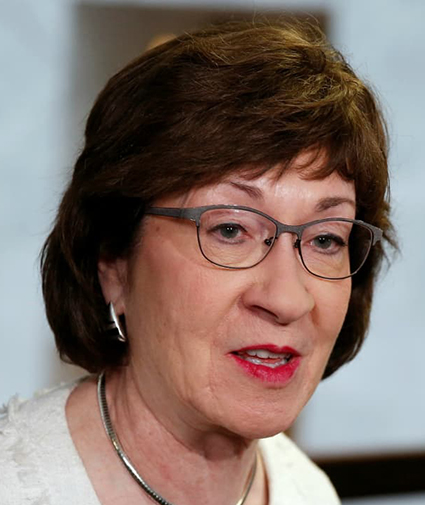WASHINGTON, (Reuters) – A key moderate Republican U.S. senator said yesterday that she will not support a nominee to fill a soon-to-be-vacated seat on the Supreme Court who would overturn a landmark legal ruling that supports a woman’s right to abortion.
The comments by Susan Collins, a frequent Senate swing vote, narrowed the path to confirmation facing any nominee Republican President Donald Trump selects to replace Justice Anthony Kennedy, who is retiring from the high court.
“I would not support a nominee who demonstrated hostility to Roe v. Wade,” Susan Collins told CNN’s “State of the Union” program, referring to the 1973 landmark abortion decision.
Abortion was expected to be a key topic for senators when they question Trump’s nominee in confirmation hearings.
The president has said he will not be asking possible nominees, whom he has already started interviewing, whether they would overturn Roe v. Wade. Anti-abortion conservatives, mostly Republicans, have long opposed the ruling.
Trump said on Friday he plans to announce his nominee on July 9 and that he has narrowed his list of contenders to about five, including two women. He did not identify any of them.
He has said he wants to move quickly and he will choose from a 25-person list of contenders compiled for him by White House lawyers and conservative legal activists in Washington.
Collins told ABC’s “This Week” program, “I told that I was looking for a nominee that would demonstrate a respect for precedent … I also suggested that he broaden his search.”
She added that there were people on Trump’s initial list that she could not support.
Republicans control the Senate, which must confirm any nominee, by a 51-49 majority, making the views of moderates such as Collins, and some Democrats, crucial to assembling the 51 votes needed for confirmation.
The task is further complicated by the status of Republican Senator John McCain, a war hero and former Republican presidential nominee. Though McCain has often defied Trump, he has been absent from Congress all year as he undergoes treatment for an aggressive brain cancer.
In addition to Collins, another Senate swing vote could be fellow Republican Senator Lisa Murkowski, who also favours abortion rights.
If Trump chooses a strongly anti-abortion nominee who favored overturning Roe v. Wade, Collins and Murkowski might withhold their support. With McCain possibly not able to vote, Trump would need the support of Democrats to win confirmation.
As a result, the focus has turned to Democratic Senators Joe Manchin of West Virginia, Joe Donnelly of Indiana and Heidi Heitkamp of North Dakota. The three face re-election in November in states that Trump won in the 2016 presidential election.
All three also voted for Trump’s first Supreme Court nominee, Neil Gorsuch. They were the only Democrats to do so.
Gorsuch restored a 5-4 conservative majority on the nine-member court. He was asked about Roe v. Wade in his confirmation hearings in March and stressed the value of legal precedent and noted Roe v. Wade has been reaffirmed many times.
Republican Senator Lindsey Graham told NBC’s “Meet the Press” show he would not vote for a nominee who has made up their mind about specific cases, including Roe v Wade.
He said, “Roe v Wade has been affirmed over the years … I am not going to vote for anyone who tells me they are going to decide a case before the facts are presented.”
While Kennedy was a conservative, he proved to be a somewhat unpredictable “swing” vote over his long career. He sided with the court’s liberals by voting in favor of abortion rights and gay rights in some cases.
Trump said in an interview with Maria Bartiromo on Fox’s “Sunday Morning Futures” program that the abortion issue could end up being decided at the state level. “Well, maybe someday it will be to the states. You never know how that’s going to turn out,” Trump said.






